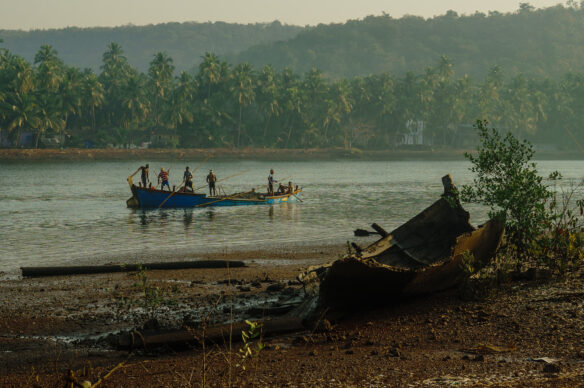
Photo source: ©© Daniel Peckham
Following is a text excerpt from the Roman Empire’s Justinian Code, 535 AD who contained provisions clearly protecting the sea, seashore, and sand.
Roman Law, the Justinian Code, was effective in the Eastern Roman (Byzantine) Empire (331–1453), and also served as a basis for legal practice in continental Europe, as well as in Ethiopia, and most former colonies of European nations, including Latin America.
The Institutes of Justinian, 535 A.D.
Book I. Of Persons
(…)
Book II.
Of Things.
I. Divisions of Things.
In the preceding book we have treated of the law of persons. Let us now speak of things, which either are in our patrimony, or not in our patrimony. For some things by the law of nature are common to all; some are public; some belong to corporate bodies, and some belong to no one. Most things are the property of individuals who acquire them in different ways, as will appear hereafter.
1. By the law of nature these things are common to mankind, the air, running water, the sea, and consequently the shores of the sea. No one, therefore, is forbidden to approach the seashore, provided that he respects habitationes, monuments, and buildings which are not, like the sea, subject only to the law of nations.
2. All rivers and ports are public; hence the right of fishing in a port, or in rivers, is common to all men.
3. The seashore extends as far as the greatest winter flood runs up.
4. The public use of the banks of a river is part of the law of nations, just as is that of the river itself. All persons, therefore, are as much at liberty to bring their vessels to the bank, to fasten ropes to the trees growing there, and to place any part of their cargo there, as to navigate the river itself But the banks of a river are the property of those whose land they adjoin; and consequently the trees growing on them are also the property of the same persons.
5. The public use of the seashore, too, is part of the law of nations, as is that of the sea itself; and, therefore, any person is at liberty to place on it a cottage, to which he may retreat, or to dry his nets there, and haul them from the sea; for the shores may be said to be the property of no man, but are subject to the same law as the sea itself, and the sand or ground beneath it.
6. Among things belonging to a corporate body, not to individuals, are, for instance, buildings in cities, theaters, race-courses, and other similar places belonging in common to a whole city.
7. Things sacred, religious, and holy belong to no one; for that which is subject to divine law is not the property of any one.
(…)
III. Servitutiones.
The servitutiones of rural immovables are, the right of passage, the right of passage for beasts or vehicles, the right of way, the right of passage for water. The right of passage is the right of going or passing for a man, not of driving beasts or vehicles. The right of passage for beasts or vehicles is the right of driving beasts or vehicles over the land of another. So a man who has the right of passage simply has not the right of passage for beasts or vehicles; but if he has the latter right he has the former, and he may use the right of passing without having any beasts with him. The right of way is the right of going, of driving beasts or vehicles, and of walking; for the right of way includes the right of passage, and the right of passage for beasts or vehicles. The right of passage for water is the right of conducting water through the land of another.
1. The servitutiones of urban immovables are those which appertain to buildings, and they are said to be servitutiones of urban immovables, because we term all edifices urban immovables, although really built in the country. Among these servitutiones are the following: that a person has to support the weight of an adjoining house, that a neighbor should have the right of inserting a beam into his wall, that he has to receive or not to receive the water that drops from the roof, or that runs from the gutter of another man’s house on to his building, or into his court or drain; or that he is not to raise his house higher, or not to obstruct his neighbor’s lights.
2. Some think that among the servitutiones of rural estates are rightly included the right of drawing water, of watering cattle, of feeding cattle, of burning lime or digging sand.
3. These servitutiones are called the servitutiones of immovables, because they cannot exist without immovables.
For no one can acquire or owe a servitude of a rural or urban immovable, unless he has an immovable belonging to him.
4. If anyone wishes to create a right of this sort in favor of his neighbor, he must effect it by agreements and stipulations. A person can also, by testament, oblige his heir not to raise his house higher, not to obstruct his neighbor’s lights, to permit a neighbor to insert a beam into his wall, or to receive the water from an adjoining roof; or, again, he may oblige his heir to allow a neighbor to go across his land, or to drive beasts or vehicles, or to conduct water across it.
(…)
Source:
From: Oliver J. Thatcher, ed., The Library of Original Sources (Milwaukee: University Research Extension Co., 1907), Vol. III: The Roman World, pp. 100-166.
Note:
Scanned in and modernized by Dr. Jerome S. Arkenberg, Dept. of History, Cal. State Fullerton.
This text is part of the Internet Medieval Source Book. The Sourcebook is a collection of public domain and copy-permitted texts related to medieval and Byzantine history.
Unless otherwise indicated the specific electronic form of the document is copyright. Permission is granted for electronic copying, distribution in print form for educational purposes and personal use. If you do reduplicate the document, indicate the source. No permission is granted for commercial use.
© Paul Halsall June 1998

Photo source: ©© Nwardez









